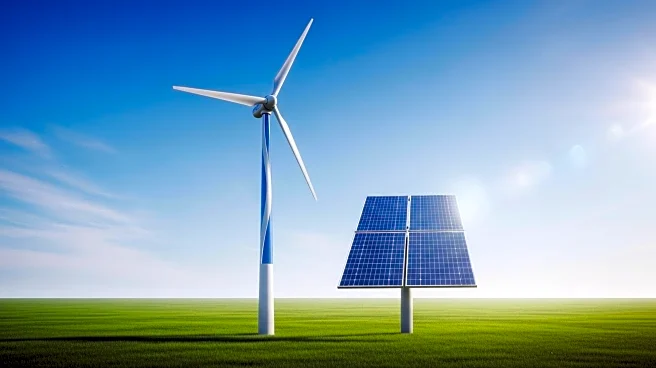What's Happening?
The International Energy Agency (IEA) has released its Renewables 2025 report, forecasting a significant increase in global renewable energy capacity. The report predicts an addition of 4,600 gigawatts (GW) by 2030, despite a reduction in growth expectations for the U.S. market due to the removal of federal tax credits under the Inflation Reduction Act. While the U.S. market faces challenges, other regions such as Europe, Asia, Africa, and the Middle East are expected to see increased growth. Solar energy is anticipated to account for 80% of the new capacity, driven by declining technology costs and faster planning processes. The IEA also highlights the concentration of solar supply chains in China, which poses a challenge for global supply security.
Why It's Important?
The IEA's forecast underscores the rapid transition towards renewable energy, which is crucial for reducing global reliance on fossil fuels and addressing climate change. The growth in renewable capacity is expected to lead to significant environmental benefits and economic opportunities, particularly in regions outside the U.S. However, the U.S. market's slower growth could impact its competitiveness in the global renewable sector. The concentration of solar supply chains in China also raises concerns about supply security, emphasizing the need for diversification. The report highlights the potential for renewable energy to transform electricity generation, although progress in heat and transport sectors remains slower.
What's Next?
The IEA advises policymakers to focus on diversifying supply chains to ensure security of supply, particularly for solar energy. As renewable energy capacity continues to grow, countries will need to address the challenges of integrating large-scale energy storage solutions, such as pumped-storage hydropower, into their grids. The report suggests that the electrification of transport and the adoption of biofuels will drive further progress in the renewable energy transition. Stakeholders in the U.S. may need to reassess policies to enhance growth in the renewable sector and maintain competitiveness.
Beyond the Headlines
The IEA's report highlights the ethical and strategic importance of diversifying supply chains to reduce dependency on a single country, in this case, China. This diversification is crucial for ensuring long-term energy security and stability. The report also points to the broader cultural shift towards renewable energy as a primary source of electricity, which could influence public policy and consumer behavior globally. The transition to renewables is not only an environmental imperative but also a strategic economic opportunity for countries willing to invest in sustainable energy infrastructure.











